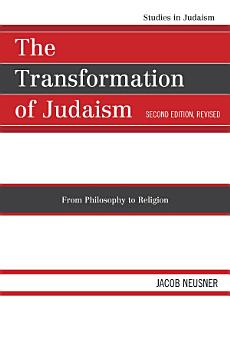The Transformation of Judaism: From Philosophy to Religion, Edition 2
Jacob Neusner
Mar 2011 · Bloomsbury Publishing USA
Ebook
316
Pages
reportRatings and reviews aren’t verified Learn More
About this ebook
Jacob Neusner describes, analyzes, and interprets the transformation of one system of the Israelite social order by a connected but autonomous successor-system. He characterizes the successive systems classifying the one as philosophical and the other as religious. He explains the categorical account of each and sets forth the outcome of a number of topical studies on the category-formations of Rabbinic Judaism with special attention to the social order: politics, philosophy, and economics. These systems emerged as [1] autonomous when viewed synchronically, [2] connected when seen diachronically, and [3] as a continuous construction when seen at the end of their formative age. In their successive stages of categorical autonomy, connection, and finally continuity, the three distinct systems may be classified, respectively, as philosophical, religious, and theological, each one taking over and revising the definitive categories of the former and framing its own fresh, generative categories as well. The formative history of Judaism is the story of the presentations and re-presentations of categorical structures. In method, it is the exegesis of taxonomy and taxic systems.
Now, after more than two decades, Neusner has decided to review the initial statement. Since the book summarizes ten years of work, from 1980 to 1990, on the Rabbinic category formations of social science politics, philosophy, and economics in the setting of the law and theology of Rabbinic Judaism from the Mishnah through the Bavli, 200-600 C.E., it seemed well worth the effort to recapitulate the original work. The revised introduction explains the omission of theology in his category-formation philosophy-religion-theology; Neusner's account of the Bavli produced the decade after this title was completed did not make possible the continuous description of the unfolding of the Rabbinic system. The pattern that appealed to Neusner from philosophy to religion to theology has not yet come to a satisfactory account. In the twenty years
Now, after more than two decades, Neusner has decided to review the initial statement. Since the book summarizes ten years of work, from 1980 to 1990, on the Rabbinic category formations of social science politics, philosophy, and economics in the setting of the law and theology of Rabbinic Judaism from the Mishnah through the Bavli, 200-600 C.E., it seemed well worth the effort to recapitulate the original work. The revised introduction explains the omission of theology in his category-formation philosophy-religion-theology; Neusner's account of the Bavli produced the decade after this title was completed did not make possible the continuous description of the unfolding of the Rabbinic system. The pattern that appealed to Neusner from philosophy to religion to theology has not yet come to a satisfactory account. In the twenty years
About the author
Jacob Neusner is a leading figure in the American academic study of religion. He revolutionized the study of Judaism and brought it into the field of religion, and he built intellectual bridges between Judaism and other religions, thereby laying the groundwork for durable understanding and respect among religions. He has advanced the careers of younger scholars and teachers through his teaching and publication programs. Neusner's influence on the study of Judaism and religion is broad, powerful, distinctive, and enduring.
Rate this ebook
Tell us what you think.
Reading information
Smartphones and tablets
Install the Google Play Books app for Android and iPad/iPhone. It syncs automatically with your account and allows you to read online or offline wherever you are.
Laptops and computers
You can listen to audiobooks purchased on Google Play using your computer's web browser.
eReaders and other devices
To read on e-ink devices like Kobo eReaders, you'll need to download a file and transfer it to your device. Follow the detailed Help Center instructions to transfer the files to supported eReaders.




